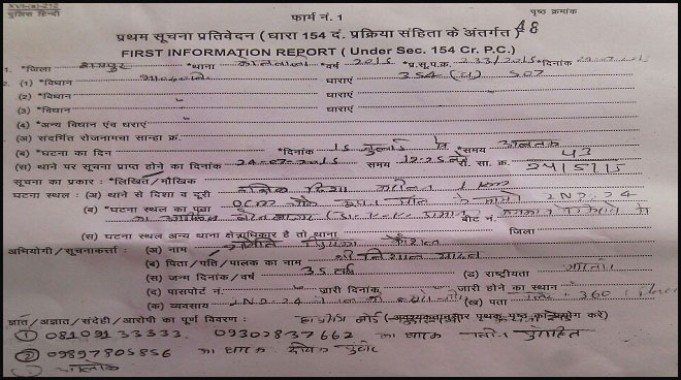Fired for reporting sexual harassment
On August 6 we reported that a woman journalist heading the Chhattisgarh bureau of television channel IND 24, was in for a shock when she called the channel’s CEO to register a complaint of sexual harassment by the channel head. Instead of recording her complaint and acting on it, the CEO found an unidentified person to abuse and threaten to kill her.
On August 6 the same chief executive, Deepak Pundhir, issued her a letter of termination. She had earlier been told she was being made redundant. The letter reiterated that and said, “now we came to know that you are getting involve unethical activities which are against organization and you have filed a false complaint against us to Police. It's very disappointing and shocking for us.
Keeping that behaviour in mind we have decided to cancel your services with immediate effect and you are now not to entitle use company office.“
This woman’s story is an unnerving indicator of the extreme vulnerability of women who live and work in smaller cities and seek to redress their work grievances. What they often end up confronting is a powerful network – the police and administration, local politicians, the business community, and the media – that is ranged against any attempt to secure justice.
The Sexual Harassment Act has laid down procedures to deal with complaints, including the constitution of an Internal Complaints Committee, but what if your company management thinks the easier way to deal with the complaint is to threaten the complainant and intimidate her into resigning from the company?
The complainant alleged that the channel head of the company, Navin Purohit, was in the habit of making suggestive remarks and reciting poetry to her. Exasperated, she stopped taking his calls for more than a month and filed a complaint with the CEO, Deepak Pundhir.
She alleged that Pundhir called her on July and invited another person for a conference call with her. This other person, identified as Alok, allegedly proceeded to abuse and threaten her.
Rattled, she filed an FIR on July 24th at Kotwali police station. She was shocked when the police investigation revealed that the phone number used by the goon who threatened her was actually in the name of a journalist who worked with another local television channel. Police have picked him up for questioning and have assured her of speedy action against the CEO and the channel head.
The Hoot contacted Purohit who denied that he had made any unseemly comments or used any suggestive language and said he was ready to face any investigation. According to him, the sexual harassment charge only came up because the woman journalist had heard that the bureau may have to close down.
Pundhir said that the journalist had been told that the channel was facing a financial crisis and had been offered her pending salary for June and July. Asked whether he had instituted an inquiry as per government norms on receiving her complaint of sexual harassment, he said he had called Purohit and sought his response. Since the latter denied the charge, he thought that that was the end of the matter.
Clearly, it is not the end of the matter. A committee comprising the requisite members as stipulated by the law, will need to be set up to investigate the charge.The woman says the two issues – of closing down the bureau and the sexual harassment charge - were unconnected but the duo are trying to make it an excuse to dismiss her complaint.
Inspector General of Raipur, G. P. Singh, told The Hoot that teams had been dispatched to Bhopal and Agra. “It takes time to get the record from the telecom companies but we are very clear that the culprits have to apprehended,” he said. The Superintendent of Police, he added, has been instructed to be very sensitive to the case.
On her part, Yogita Khaparde, officer in-charge of the Kotwali police station, told The Hoot that the matter is under investigation and action would soon be taken against the accused.
The complainant’s battle is at multiple levels. What started out as a sexual harassment complaint against a colleague became a labour issue as her job and her pending dues are at stake with the imminent closure of the bureau.Then she alleges there is the wider threat to her by the company CEO, local goons and a local journalist who appears to have joined hands with them.
Determined to keep up the struggle to book the perpetrators, she says she wishes she had done a rigorous check of the antecedents of the company and of the sponsors that floated the television channel. “Journalists hope for better career opportunities by joining such channels and then land up in a mess with organisations that merrily use strong-arm and underhand methods”, she says.
Her experience suggests that a complete audit of all news channels – their employee practices, funding sources, financial viability, codes of conduct – might be useful so that journalists know what they are getting to when they take up jobs with these channels. With so little information about them available in the public domain, it is near impossible for journalists to exercise caution.
